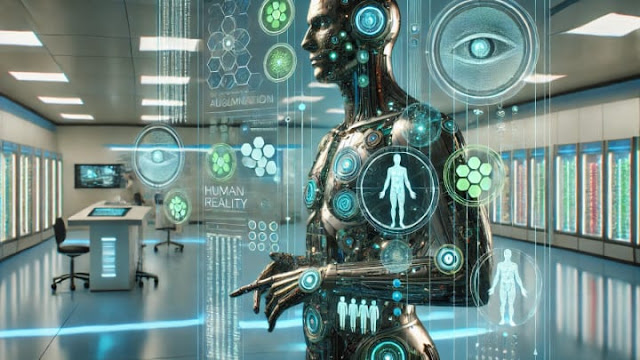For centuries, humans have fantasized about superhuman abilities—super strength, telepathy, immortality, and beyond. What was once confined to comic books and mythology is now entering the realm of scientific possibility. Advances in biotechnology, neuroscience, and artificial intelligence (AI) are pushing the boundaries of human potential, blurring the line between science fiction and reality. From brain-computer interfaces that enable mind-controlled prosthetics to gene-editing tools that could enhance physical performance, technology is reshaping what it means to be human.
Enhanced Physical Performance: Beyond Natural Human Limits
The human body has inherent biological constraints—muscle
fatigue, bones break, and endurance have limits. But emerging technologies are
allowing us to surpass these barriers.
Exoskeletons and Bionic Enhancements
Powered exoskeletons, once a military dream, are now
assisting paralyzed individuals to walk again and enabling workers to lift
heavy loads effortlessly. Companies like Ekso Bionics and Sarcos
Robotics have developed wearable robotic suits that amplify strength
and stamina. The U.S. Army is testing exoskeletons that allow soldiers to carry
90+ pounds without strain, while medical exoskeletons like ReWalk restore
mobility to spinal cord injury patients.
Gene Editing for Superhuman Traits
CRISPR-Cas9, the revolutionary gene-editing tool, is being
explored for enhancing physical abilities. Scientists have identified genes
like MSTN, which regulates muscle growth—deactivating it in animals
has led to "super muscular" mice. Athletes might one day use gene
therapy to boost endurance or strength, raising ethical concerns about
"genetic doping." Meanwhile, myostatin inhibitors are
already being tested to combat muscle-wasting diseases, with potential misuse
in sports.
Synthetic Biology and Biohacking
Biohackers are experimenting with implantable
magnets for sensing electromagnetic fields or night vision eye
drops using Chlorin e6 (a compound found in deep-sea fish). While
still fringe, these DIY enhancements hint at a future where humans customize
their bodies like software.
Ethical Dilemma: Should physical enhancements be
restricted to medical use, or should healthy individuals have the right to
upgrade themselves? Will this create a new class of "superhumans"
with unfair advantages?
Cognitive Augmentation: Expanding the Power of the Mind
Human intelligence has long been considered fixed, but
neurotechnology is challenging that notion. From brain implants to nootropics,
science is unlocking ways to boost memory, focus, and even telepathic
communication.
Brain-Computer Interfaces (BCIs) for Thought Control
Elon Musk’s Neuralink and companies
like Synchron are developing BCIs that allow paralyzed
patients to control computers with their minds. In 2023, a ALS patient used a
Neuralink implant to play chess telepathically. Future applications could
include direct brain-to-brain communication, effectively enabling
telepathy.
AI-Enhanced Cognition
AI tools like ChatGPT and memory-enhancing
implants are augmenting human intelligence. The U.S. military’s Next-Generation
Nonsurgical Neurotechnology (N3) program aims to create helmets that
boost soldiers’ cognitive abilities in real time. Meanwhile, nootropics (smart
drugs) like modafinil are already used by Silicon Valley elites to enhance
productivity.
Memory Editing and Neural Uploads
Scientists have successfully implanted false
memories in mice and are exploring ways to erase traumatic ones in
humans. Projects like Mind Uploading (preserving consciousness
digitally) could one day allow humans to "back up" their
minds—raising philosophical questions about identity and immortality.
Ethical Dilemma: If intelligence becomes
upgradable, will society split into "enhanced" and
"natural" humans? Could governments or corporations manipulate
thoughts via BCIs?
Extended Longevity: The Quest for Biological Immortality
Death has been humanity’s ultimate limit—but biotechnology
is making radical life extension plausible.
Senolytics and Aging Reversal
Drugs like rapamycin and metformin are
being tested to slow aging by clearing "zombie cells" (senescent
cells). Companies like Altos Labs (funded by Jeff Bezos) are
researching cellular reprogramming to reverse aging in humans. In 2023, a
Harvard team successfully rejuvenated mice’s eyesight, hinting at broader
applications.
Cryonics and Mind Preservation
Organizations like Alcor freeze bodies (or
just brains) in liquid nitrogen, hoping future tech can revive them. While
still speculative, advancements in nanotechnology and stem
cell regeneration could make resurrection feasible.
Genetic Engineering for Lifespan Extension
The LONGevity Genes Project studies
centenarians’ DNA to identify longevity-linked genes like FOXO3.
CRISPR could one day edit these genes into embryos, creating
"ageless" generations.
Ethical Dilemma: If only the wealthy can afford
immortality, will overpopulation or societal stagnation occur? Should death
remain a natural part of life?
Sensory Expansion: Seeing the Invisible and Hearing the Unheard
Human senses are limited—but technology is granting us superhuman
perception.
Magnetic and Infrared Vision
Researchers have given rats infrared vision by
injecting nanoparticles into their eyes. Humans could soon see in the dark or
detect UV/IR spectra. Meanwhile, biohackers with implanted magnets claim
to "feel" electromagnetic fields.
Augmented Hearing and Ultrasonic Detection
Cochlear implants already restore hearing, but future
devices might detect ultrasonic or subsonic frequencies. Military
tech allows soldiers to hear whispers from 100+ meters away.
Direct Neural Sensory Input
DARPA’s "Cognitive Technology Threat Warning System" streams drone feeds directly into soldiers’ brains, creating a 360-degree awareness. Civilian applications could include real-time language translation fed directly into the auditory cortex.
Ethical Dilemma: If humans gain bat-like sonar or predator-like night vision, how will this reshape society? Will enhanced senses create sensory overload or new forms of discrimination?
Conclusion: The Future of Human Evolution
We stand at the dawn of a new era where biology and
technology merge, granting abilities once deemed supernatural. The question
is no longer if we can achieve superhuman traits, but how we
should govern them.
Will these advancements create a utopia of enhanced humans,
or a dystopia of inequality and control? The answer depends on how we navigate
the ethics, accessibility, and regulation of these technologies. One thing is
certain: the future human will be unlike any that has existed before.






0 Comments